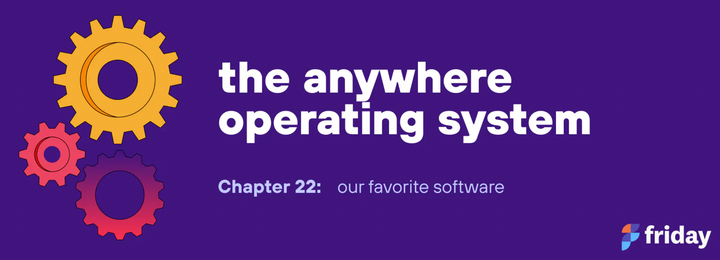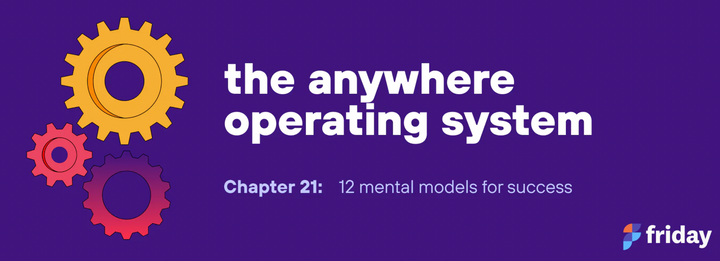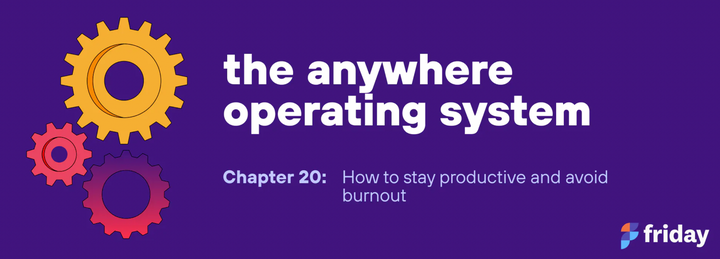Chapter 12: How to create accountability from afar
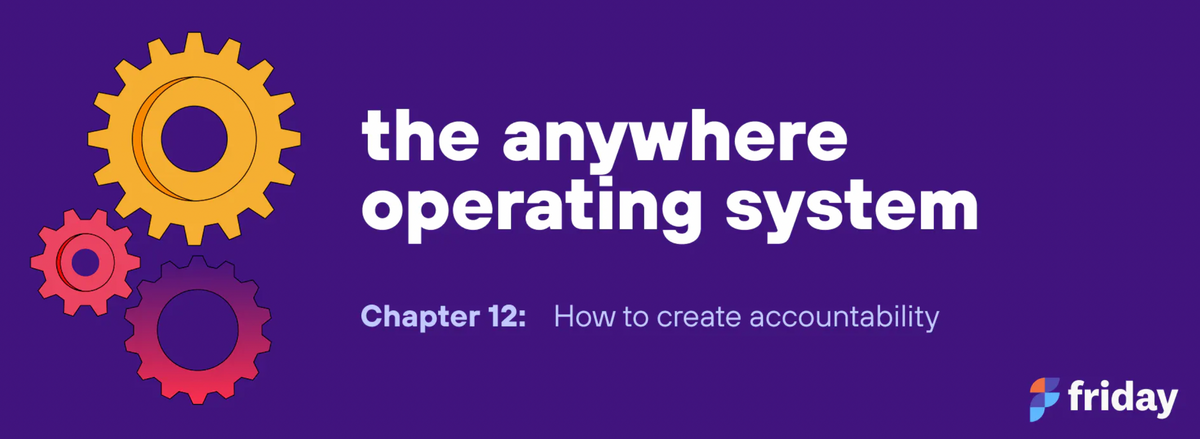
As your organization learns to work-from-anywhere, you may wonder how you can create a sense of accountability.
You want to believe that your team will work on the most important things and that you can be hands-off. At the same time, you need to create an environment where everyone feels a sense of responsibility for their output. To use a sports analogy: as a coach, you have a responsibility to call the play, but you also need to let the team run the play, too.
Why is it tough to create accountability when remote?
There’s a few reasons why you may struggle to create accountability when apart. Here’s a few factors to consider:
1. Fewer data points and observational cues
As I discussed earlier in the book, when you are in the office, it’s easy to learn through osmosis and manage by walking around. Now, you have less data to observe. As a result, you feel out of the loop.
2. Fewer opportunities to nudge
In the best book I’ve ever read on leading a team (High Output Management), Andy Grove shares that nudging is one of the most important activities a leader can do. Here’s how he describes it:
"You often do things at the office designed to influence events slightly, maybe making a phone call to an associate suggesting that a decision be made in a certain way...In such instances you may be advocating a preferred course of action, but you are not issuing an instruction or a command."
It’s easy to nudge people when you are all in the same place. Additionally, these quick chats can help people stay aligned and accountable.
3. Commitments are too vague and easily forgotten
This issue happens at the office, too, but it’s easy to tell a colleague in a meeting that you will do something, only to forget about it. A while later, each person has a different recollection of what was discussed and there's nothing to reference, which creates frustration.
This breakdown can lead to a feeling that people aren’t taking responsibility for their actions.
The building blocks for accountability
Let’s build a conceptual model for how we can fix the problems mentioned above. At a high level, accountability is defined as a willingness to accept responsibility or to account for one’s actions.
If you say you will do something, will you actually do it? Let’s break this down into a few components:
1. A commitment to perform an activity in the future
This first part is not rocket science. You need to share what you aim to accomplish in a specific timeframe.
Example commitments:
- “I will ship this code by the end of today”
- “I send the status report before your next meeting”
The format is straightforward and should be written: I will do [activity] by [due date]. Research shows that if you write down your goals, you are 42% more likely to achieve them.
2. Sharing progress along the way
This next part isn’t required, but is certainly helpful as it can be difficult for others to know what the current status of a project. If someone on your team isn’t proactively sharing this information, it’s likely that you will wonder, “how is that project going?” Eventually, you will ask about it.
If you are like me, you hate asking people for an update, but you also need to have insight so you can course correct and nudge if projects get off track.
3. Delivery, reflection, and inspection
One of the most important components of accountability is delivering on what you said you would do. If you said you would have something done by the end of the day, did you get it done? If not, why?
Missing deadlines is a reality of work that will never go away, which is why reflection and continuously improving should be the aim. How will you improve tomorrow?
4. A little peer pressure along the way
Similar to writing your goals, research shows that when you share a goal with others, you are more likely to accomplish it. This is because you feel a sense of peer pressure. You told a coworker you would do something and you don’t want to let them down.
Can we systematize accountability?
Using these components, can we create repeatable systems for staying accountable? I’ve tried to use project management tools to accomplish this goal, but it rarely becomes a habit without herculean amounts of effort. Is there a better way?
I think so. Here’s what we do.
1. Establish weekly priorities on Monday
At the beginning of the week, each person on our team answers two questions in Friday:
- How was your weekend? (open-ended)
- What do you aim to accomplish by the end of the week? (open-ended)
The answers are shared with the entire company. The first question is fun, but the second question sets a foundation for the result that we can expect from each teammate by the end of the week. As a leader, I am able to understand where each person is pointed, and, if I need to nudge them in another direction, I can do this early in the week.
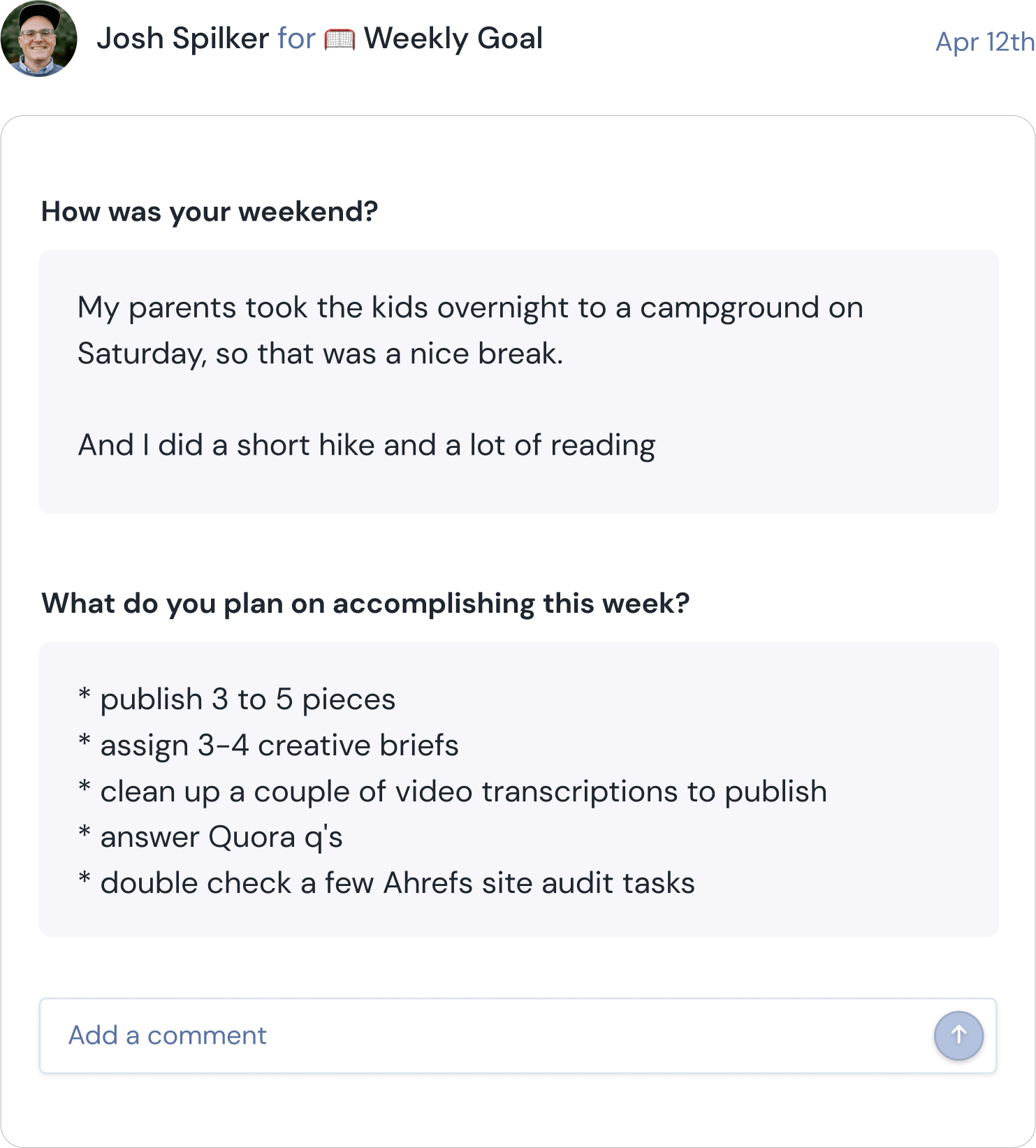
2. Share progress with daily standups
Next, every day at 9 a.m., each person quickly shares an update for the following questions:
- What did you accomplish yesterday? (open-ended)
- What are you working on today? (open-ended)
- Anything else you’d like to share? (open-ended)
These answers are shared publicly too. This helps everyone see what’s going on right now. It also helps create a habit of being thoughtful about how you allocate your time.
3. Recap your week
At the end of the week, on Friday, we ask a few more questions:
- How did you feel about the week (emoji)
- How productive were you this week? (1-10 scale)
- What went well? (open-ended)
- What was the worst part of your week? Is there anything I can do to help? (open-ended)
Unlike other routines, this is only viewed by me. Because these answers aren’t shared with the broader group, there’s less filtering that happens, which gives incredible insight into what’s really going on at work and helps kickstart more effective 1:1 conversations and fix potential problems.
Why does this work?
If you think about it, people have used habit journals and planners to accomplish similar outcomes for personal productivity. We are using the same principles in a team setting. If we use the accountability framework listed earlier in the chapter, we are:
- Making commitments at the beginning of the week (Monday priorities)
- Sharing progress along the way (via daily standups)
- Reflecting at the end of the week and making adjustments (Friday recap)
Most importantly, these routines involve writing commitments down and sharing them with others, which we know improves the likelihood that people will hit their goals.
To wrap up, we’ve created a repeatable system for staying accountable. If you adopt a similar set of routines, I’m sure you will find success as well!
Aisha’s Perspective
“Doing daily routines with Friday really helps me stay accountable with myself. It’s easy to fall into the trap of walking into your day blindly, especially when working remotely. There’s no longer someone behind your back making sure you get the work done.
When doing the routines, I’m forcing myself to address my tasks. I tell myself what I want to accomplish during the week. During my daily standups, I showcase my day-to-day progress. At the end of the week, I see how that week went.
Unlike my other in-person jobs, I am the one in control of my progress and accomplishments. It’s a great feeling of being able to come up with my own priorities at work, and seeing them through to completion. And while it does benefit me personally, I feel like it also helps the team. Sharing tasks with everyone else makes me more willing to want to do it. Also, if I’m ever stuck on something, the team is willing to help me because I share my progress.”
Want to keep reading? In the next chapter we discuss how to foster trusted working relationships.
